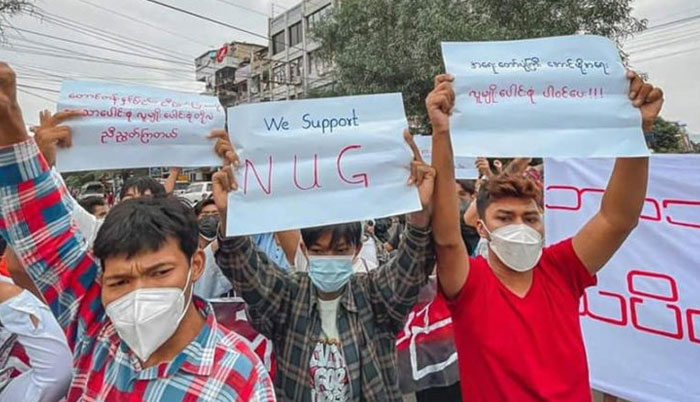![]() Home > Myanmar
Home > Myanmar
Myanmar Junta’s Caretaker Government On Course To Fail

Followers of different faiths stage an anti-regime protest in Mandalay on August 13. / Spring Diary
![]() August 16th, 2021 | 09:44 AM |
August 16th, 2021 | 09:44 AM | ![]() 2345 views
2345 views
MYANMAR
Myanmar’s military regime, which has dubbed itself the State Administration Council since the February 1 coup, recently proclaimed that it was inaugurating a caretaker government which will step down after cleaning up the mess left behind by what the junta regards as an incompetent and corrupt National League for Democracy (NLD) administration. An election is supposed to follow sometime in 2023 and a new government will then be inaugurated.
The term ‘caretaker government’ invokes remembrance of times past and the first of four military interventions following independence. Between 1958 and 1960, a highly successful, if authoritarian and dictatorial, military administration governed. It was formed on the basis of a “constitutional coup”, as military control seemed inevitable but was in fact approved by the legislature. Following that interregnum, the military held free elections, in which its preferred party lost, and the military retired [temporarily], returning the government to the then Prime Minister U Nu.
In 1960, the military proclaimed its outstanding success. On terminating its ruling role, it specifically likened its accomplishments to Hercules cleaning out the Augean Stables. Its Ministry of Information acclaimed its deeds in the volume: Is Trust Vindicated? A Chronicle of a Trust, Striving, and Triumph. Being an Account of the Accomplishments of the Government of the Union of Burma, November 1, 1958-February 1, 1960. In the estimations of today’s internal or external observers, will this present caretaker regime succeed as the first caretaker government did in 1958-60? As Eliza Doolittle said in My Fair Lady, “Not bloody likely”.
The origins and conditions of both coups are different. In 1958, the politically ubiquitous Anti-Fascist People’s Freedom League was split by personal rivalries and civil war was feared by the military, which was already fighting two communist insurgencies and a Karen rebellion. It was a peaceful transfer of power, with little overt dissent, at least among the majority Bamar people, because of the blatantly ineffective civilian administration.
The military substituted army officers in critical positions throughout the government and they were uncorrupt and effective, if demanding and insensitive to local feelings. But there were no political arrests and no one was killed. What was a loss for democratic governance was compensated for by a string of successful economic, political and even international measures.
Prices were forcibly lowered in the bazaars, the military efficiently ran an extensive series of economic ventures, some 170,000 squatters were removed to the outskirts of Rangoon, the legal prerogatives of the Shan sawbwas were terminated, education was improved and a Burmese Oxford professor became vice-chancellor of Rangoon University, while a border agreement was negotiated with China. This period may have provided both the rationale and belief for the military that it could effectively run the country for a longer period. History has proven this to have been an illusion.
Present conditions are counter to those of 1958. The NLD’s sweeping victory in the November 2020 election may not have been an endorsement of the rather ineffective Daw Aung San Suu Kyi government, although it probably was an endorsement of her personally, but it evidently reflected the widespread distrust of another potential administration influenced or controlled by the military. The extensive nationwide violence against the subsequent coup, whose opponents straddle all classes and regions, is an indication that the fairly extensive reforms of freedom over the previous decade have inoculated the population against repression. The military has responded with over 900 civilian deaths and more than 5,000 arrests and the people are equally vehement in their rejection of the coup. The deaths, violence, and unrest associated with the current state of play in Myanmar will not go unremembered in the future.
In 1958, the military was uncorrupt, vigorous and motivated by a sense of patriotism in saving the state from unprincipled civilian politicians it regarded as bent on their own aggrandizement or, in the case of Prime Minister U Nu, adhering to his unrealistic Buddhist-based sense of governance. The same cannot be said today, with the generals in control of much of the economy and retired members of the military and their cohorts ensconced in positions of economic advantage. Shared poverty was once a national characteristic. It isn’t now.
Today’s resistance to the military is unprecedented in modern Burmese history, surpassing the failed people’s revolution in 1988. Then, the slaughter by the military was far greater but resistance was not founded on violence. Today, the widespread opposition has discarded Daw Aung San Suu Kyi’s former insistence on non-violence. Death tolls on all sides continue to climb. As hostilities on both sides continue, the purist moral position of the opposition will probably suffer.
Some talk of the beginnings of civil war or a Syrian-style debacle. These seem extreme views but, even if the military were able to prevail until their supposed departure from office in 2023, public acquiescence is far more difficult. The exposure to freedoms built over the previous decade vaccinates against easy compliance with any new government the military would be willing to tolerate. Its objective is evidently to destroy the NLD and render Daw Aung San Suu Kyi politically demolished for her remaining vital years either in jail, under house arrest or under legal and political restrictions that the military will enact.
The next two years, whatever the outcome, will be difficult and destructive. The caretaker government concept is more akin to a warden monitoring the activities of the state’s confined inmates, alas, than the nurturing of the needy.
Source:
courtesy of THE IRRAWADDY
by DAVID I. STEINBERG
If you have any stories or news that you would like to share with the global online community, please feel free to share it with us by contacting us directly at [email protected]